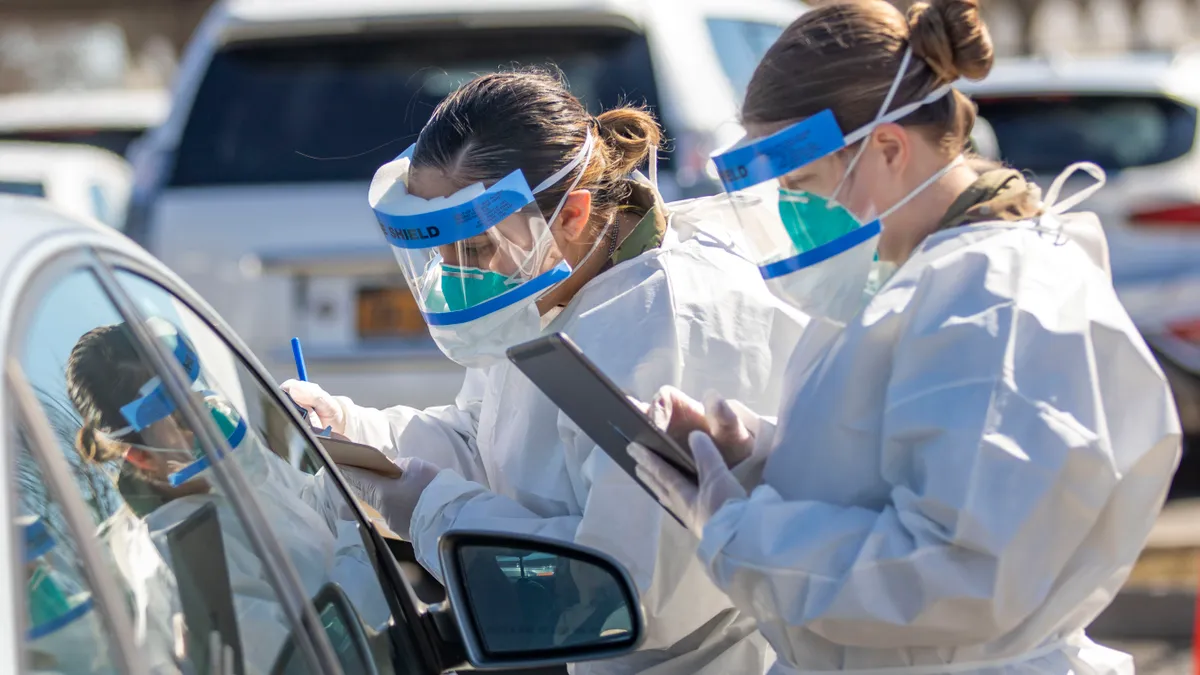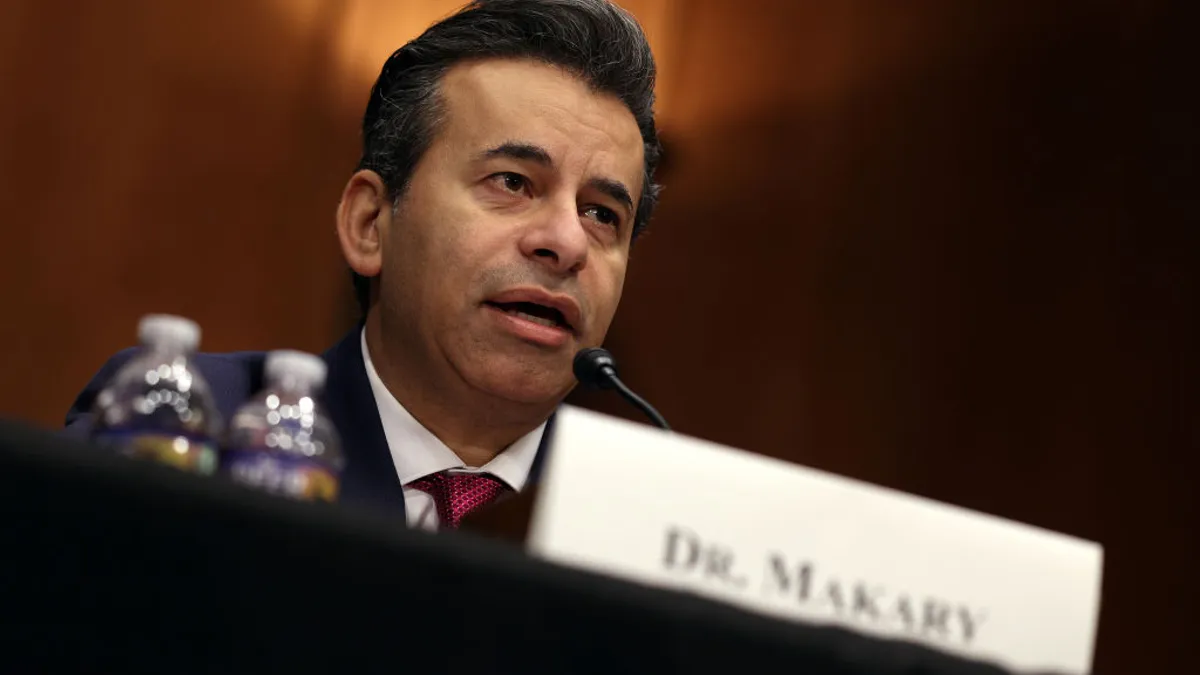As states reopen their economies and loosen coronavirus restrictions on businesses, employers are looking for safe and cost-effective ways to have their employees return to work this summer and into the fall.
But while testing giants LabCorp and Quest are pitching services to employers to detect active infections and antibodies, companies don't seem to be in any rush. Concerns about accuracy, logistics and little consistent guidance from the federal government are among the factors holding them back.
The vast majority seem on the fence about such testing, according to employer groups interviewed by MedTech Dive. A survey of more than 1,000 companies released June 2 by employment law firm Littler echoes the hesitation.
"There is some uncertainty about testing and the accuracy and availability of tests," Amber Clayton, director of the Knowledge Center at the Society for Human Resource Management, a professional HR membership association, told MedTech Dive, noting her group has yet to issue guidance.
Molecular diagnostics only record a certain point in time, she noted, and for antibody tests there's "no clear research on whether or not somebody who had COVID-19 can get it again."
LabCorp's return-to-work services include an at-home molecular diagnostic collection kit and fingerstick antibody blood test, as well as check-in health questionnaires and temperature screens. Quest offers similar services as well as telemedicine and contact tracing.
Among Quest's early customers is Delta Air Lines, which last week was slated to begin testing employees for active coronavirus and antibodies partnering with the Mayo Clinic. Delta's goal is to test all employees in what CEO Ed Bastian called a "full testing protocol" in an employee memo, adding it was an essential step to "begin the return to normal operations."
Quest is working with other airlines on molecular diagnostic and antibody testing, Wendi Mader, executive director of employer population health programs at Quest, told MedTech Dive, also citing interest from the retail and manufacturing industries.
"Some employers are actually going to be testing once a week — these are high-touch employees including flight attendants, pilots, retail workers, especially in areas where there's been high incidence rates," said Jim Davis, executive vice president of general diagnostics for Quest, earlier this month at the Jefferies Virtual 2020 Healthcare Conference.
LabCorp told MedTech Dive it is working with a range of companies, though a spokesman declined to list any current customers.
Both LabCorp and Quest suffered total testing drops in the first quarter amid the broader non-emergency health system shut down. LabCorp CEO Adam Schechter noted that even its near-term goal of performing 100,000 molecular tests and more than 200,000 antibody tests per day is just a small slice of the roughly 530 million tests it does annually. Quest's CEO made similar comments.
No silver bullet
The Littler survey found an overwhelming majority of employer respondents plan temperature checks (89%) and symptom screenings (72%) as a return-to-work strategy. Only a small number indicated they would conduct antibody (8%), antigen (7%), and diagnostic (6%) tests for employees.
David Zieg, partner and clinical services leader for HR consulting firm Mercer, said while evidence supports physical distancing to prevent spread of COVID-19, "testing is not a silver bullet."
At the same time, he said broad employee testing combined with contact tracing "may be clinically reasonable and valuable in high prevalence situations" such as meat packing plants that have been hard hit with coronavirus cases.
A recent poll of 44 large employers by the Business Group on Health cited inconsistent federal, state, and local guidelines as well as inconclusive data on testing efficacy among the top three challenges to reopening worksites.
The group's vice president Kathleen O’Driscoll noted to MedTech Dive a lot of "hype" around antibody testing with inconclusive evidence about the immunity of individuals who test positive for the antibodies.
"Just because a test comes back with antibodies it doesn't give them the all-clear," she said. "That's why viral testing right now is more of a focus."
Further, federal employment guidance actually discourages broad use of serology tests.
The Equal Employment Opportunity Commission's latest guidance on return-to-work actions says diagnostics are permissible under the Americans with Disabilities Act, given the direct threat an infected employee would potentially pose to others in the workplace. But when it comes serologic testing, the agency said tests for the presence of COVID-19 antibodies are not permitted under the ADA to determine whether employees are allowed to return to work.
"In light of CDC’s Interim Guidelines that antibody test results 'should not be used to make decisions about returning persons to the workplace,' an antibody test at this time does not meet the ADA’s 'job related and consistent with business necessity' standard for medical examinations or inquiries for current employees," the EEOC stated. "Therefore, requiring antibody testing before allowing employees to re-enter the workplace is not allowed under the ADA."
It's a concern shared in Littler's report, which said "even if reliable antibody tests eventually do become available, employers would likely face challenges proving that the test is 'job-related' (as required under the ADA) because healthy employees who are fit for duty, but do not have the antibodies demonstrating possible immunity, would fail the test."
Quest's Mader observes that employers currently are most interested in molecular diagnostics that test for active virus infection as they decide on a return-to-work strategy. "That's been the number one priority for employers." However, she contends that "antibodies are only going to prove to be more effective as time goes on with this pandemic."
Mader predicts employers will eventually move toward antibody testing "as the science continues to get better." She noted the problems with serologic tests early on in the pandemic that "were not as high quality" and "gave serology testing a little bit of a bad name out in the market." Mader believes that's been corrected.
Rivals inch in
Despite these challenges, LabCorp and Quest face increasing competition from both healthcare systems and tech companies entering the return-to-work services space.
ChristianaCare, one of the largest healthcare providers in the mid-Atlantic region serving Delaware and parts of Pennsylvania, Maryland and New Jersey, earlier this month launched a telehealth Employee COVID-19 Symptom Monitoring and Testing Program. So far, 12 employers in Delaware are participating with about 5,000 employees being monitored.
Verily, an Alphabet company, announced last week launch of its Healthy at Work program combining symptom screening, testing services, and data analytics. The initiative comes on the heels of Verily’s Baseline COVID-19 Testing Program which has tested more than 220,000 individuals across 13 states in partnership with state and local public health authorities.
What may potentially muddy the waters in the decision-making process for employers is confusion over who pays for such testing. While Congress mandated that insurers pay in full at no costs to patients, there's lack of clarity on how that applies to the biggest self-insured companies and under what circumstances.
Neither the Business Group on Health or Littler surveys reported concerns from employers about the cost of return-to-work testing services.
However, speaking earlier this month at the virtual Jefferies Healthcare Conference, Quest CFO Mark Guinan said the company's "understanding is that the CARES Act requires this [testing] is reimbursed — there are no frequency limitations at this point." In regard to payers, Guinan added, "we believe that legislation requires that they reimburse it."
"Testing is not inexpensive so that's something that employers have to consider," said Mercer's Zieg, especially if the reimbursement of tests becomes an issue.




















